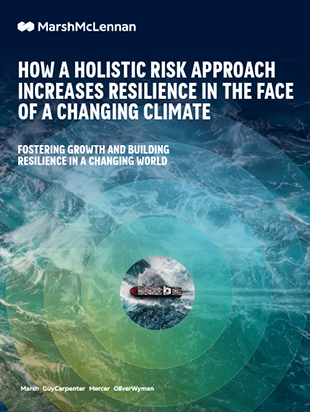A changing climate is already impacting communities, economies and countries, revealing the severe consequences of a warming world.
Recent developments, from rising temperatures to historic flooding, raise critical questions about infrastructure resilience and climate risk management.
Many communities and critical infrastructures are ill-equipped to handle extreme weather events, which are expected to increase as the climate warms.
Insurance can provide financial protection, but a significant protection gap exists, particularly in developing countries and even in developed nations.
Currently, there is capacity in the industry to create new protection schemes, but regulatory and demand-side challenges hinder the development of innovative risk finance solutions.
In this report prepared for COP29, Marsh McLennan climate experts map out how you can apply a holistic risk approach to increase resilience in the face of a changing climate.
How a holistic risk approach increases resilience in the face of a changing climate
Use this report to:
Implement a holistic approach to risk management
Apply a climate adaptation and resilience framework
Assess the return on investment for adaptation interventions
Develop optimal climate risk financing strategies

Report FAQs
Why is there an urgent need to adopt a holistic approach to climate risks?
Many communities and critical infrastructures are ill-equipped to handle extreme weather events, which are expected to increase as the climate warms. Insurance can provide financial protection, but a significant protection gap exists, particularly in developing countries and even in developed nations. Climate change is likely to worsen this gap unless proactive measures are taken. Concerns about insurance affordability and availability are growing as climate change introduces new uncertainties.
What are the components of a holistic approach?
A holistic approach to risk management is essential, focusing on financially viable solutions that provide protection for individuals and entities. This involves three integrated components: risk assessment, risk adaptation and risk financing. This approach emphasizes a “total cost of risk” perspective, combining risk finance and climate adaptation to create effective pathways for resilience, which will vary by region and risk characteristics.
How are catastrophe models used to assess the impact of climate change?
By providing detailed insights into potential disaster impacts, catastrophe models can assist in formulating policies and planning for infrastructure development and emergency response. This is crucial for minimizing the socioeconomic impacts of disasters. Governments can also use catastrophe models to help ensure that adequate financial resources are available to support recovery efforts and maintain economic stability in the aftermath of natural disaster shocks. Catastrophe models can also be leveraged to guide investment in infrastructure and community development projects.
What are the key elements of a strong adaptation and resilience framework?
Marsh’s adaptation framework offers a comprehensive method for corporates or large organizations to address climate adaptation and resilience. It starts with identifying interventions to increase the resilience of physical assets, improve operations, protect people, and enhance emergency response. Asset-level resilience measures can look like implementing flood defenses to protect a site from flood damage or controlling working conditions for workers in heat-affected regions. In addition, system-level considerations such as suppliers, customers, critical infrastructure, resources and ecosystem services, governments and regulators, capital providers, and communities are also important to understand the total costs of risks as well as direct and indirect risk drivers.
Authors and Contributors
Marsh
- Lara Whitmore, Project Manager, Climate and Sustainability, Marsh
Guy Carpenter
- Sandra Hansen, Head of International Peril Advisory, Guy Carpenter
- Katy Reyner, Assistant Vice President, Global Peril Advisory, Guy Carpenter
Marsh McLennan
- Swenja Surminski, Managing Director, Climate and Sustainability, Marsh McLennan
Our specialists were in attendance to share insights on climate risk and help organizations build resilience.
Our specialists were in attendance to share insights on climate risk and help organizations build resilience.

